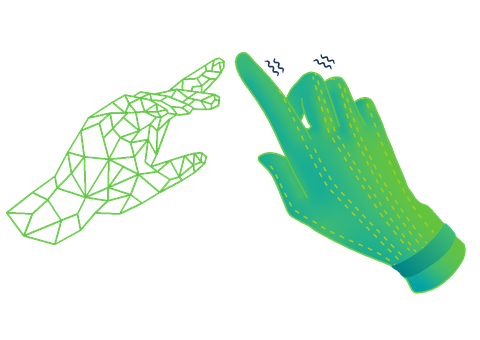Research News
Here you will find study updates and information on completed studies, among other things.
2023-11 | CeTI-Age - Study published
In this study, which is part of the larger "MultiSensP" project, the "CeTI-Age-Kinematic-Hand" database was developed to record hand movements of people of different age groups. This database provides valuable insights into the variations of hand movements and contributes to the improvement of human-machine interaction. Read on to find out more or read the original Behind the paper article: https://communities.springernature.com/posts/empowering-inclusive-technology-exploring-and-exploiting-the-diversity-of-hand-movements-with-the-ceti-age-kinematic-hand-database.
In the realm of digital and communication technology, groundbreaking advancements like the Tactile Internet and the Metaverse have emerged with the aim of revolutionizing how humans interact with machines. These innovations offer a more immersive experience, enabling individuals to feel a stronger sense of presence in digital or remote environments. They surpass traditional communication methods by incorporating haptic inputs and feedback, resulting in a heightened sense of realism and immersion in real, digitized, or remote settings.
To delve deeper into the intricacies of hand movements, we have curated a comprehensive database encompassing individuals of various age groups. By leveraging specialized data gloves, we were able to record and capture the intricate motions of the hand. These gloves house integrated sensors capable of capturing precise data pertaining to hand movements. In our study, we enlisted the participation of 63 individuals ranging from 20 to 80 years old, who performed six repetitions of 40 distinct natural hand movements at their own pace. By incorporating individuals from different age groups, we ensured that our database accurately represents the natural variations in hand movements spanning adulthood.
Moreover, we developed 3D models of hands to enhance our understanding of how they move. These models not only help us gain insights into hand movements and enhance their classification accuracy but also have the potential to assist in hand rehabilitation and contribute to the design of robots and technologies that aid in motion.
The database, made possible through Open Science, is a valuable resource for researchers and developers seeking to develop applications and improve the interaction between humans and machines. It provides information about hand movements and supports the development of age-appropriate applications and ergonomically optimized hand devices or data gloves. Furthermore, Open Science promotes collaboration and transparency by granting researchers and developers access to a diverse range of kinematic hand motion data. This accessibility, in turn, contributes to the refinement of artificial intelligence algorithms and the advancement of human-machine interaction.

This image shows t-SNE embeddings of sensor data applied to a specific set of hand movements. t-SNE (t-Distributed Stochastic Neighbor Embedding) is a technique used to visualize data points in lower dimensions. It enables the representation of intricate data, like sensor data collected from hand movements, in a two-dimensional or three-dimensional space. In the image, the scattered points represent distinct embeddings, while the centers depict the respective hand movements themselves. Copyright: This image was originally shared in a post in communities.springernature.com: [https://go.nature.com/3t3MwLn].
You can access the research article and the database here: https://rdcu.be/dCvIE
This project is funded by the German Research Foundation (DFG) as part of the Excellence Strategy of the German Federal and State Governments - EXC 2050/1 - project number 390696704 - as a Cluster of Excellence "Centre for Tactile Internet with Human-in-the-Loop" (CeTI) of the Technische Universität Dresden. This project was also partially supported by the Federal Ministry of Education and Research (BMBF) and the German Academic Exchange Service (DAAD) as part of the project 57616814 (SECAI, School of Embedded and Composite AI).
Open Access funding made possible and organized by Project DEAL.

